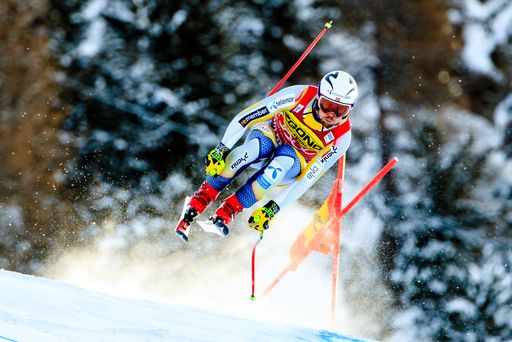Speed Freaks – Turbulent times


The 2020-21 World Cup season started under the same Covid cloud that had cut short the ’19-20 season. The race calendar had been rescheduled and safety measures put in place, but even so, an alarming number of racers started recording positive Covid tests.
World Cup champion Aleksander Aamodt Kilde from Norway tested positive after the opening race in Sölden, and the whole Swedish women’s team were forced to sit out the World Cup in Levi Finland after a coach tested positive. For Swede Anna Swenn-Larsson the bad luck continued, and after returning home to Äre, she then tested positive herself and was forced back into quarantine. When she finally got herself on skis, she broke her ankle in a training accident.
Austrian Marco Schwarz and three Swiss Loïc Meillard, Justin Murisier and Marco Odermatt all tested positive in November but were all able to resume racing after quarantine. The racer worst hit by the virus was Manfred Moelgg, who was hospitalised in Brunico for a short period, stating, “this disease is costing me a lot of energy.” At 38 Moelgg is one of the oldest Slalom racers on the tour, and thankfully, his energy returned enough to post an 8th place in the Schladming Night race.
Despite the set-backs, once the season started to unfold, it was clear that the national teams with the best access to home glacier skiing were looking the best prepared, particularly the Swiss, Italians and the Norwegians.
One exception was team USA, whose only summer training had been the postage stamp-sized glacier at Mt Hood Oregon. Paula Moltzan scored a career best 2nd place in the Lech parallel, Tommy Ford placed 2nd in the Santa Caterina GS, and Breezy Johnson has so far recorded four 3rd-place finishes in downhill. Ryan Cochran-Siegle won his first race at the Bormio Super-G, then pulled off two of the best recoveries of the season, the following day in the Downhill.
Mikaela Shiffrin emotionally won her first race since the death of her father last season, but declared that her victory in the Courchevel GS did not mean she was back. The multi-talented Shiffrin has stayed with her preferred technical disciplines, but has lacked the killer instinct that made her almost unbeatable in previous seasons.
The Covid situation did not improve much in January, with the classic Lauberhorn race in Wengen cancelled due to an outbreak of the ‘British’ strain of the virus taking hold in the town. A week later, the Hahnenkamm race in Kitzbühel, looked under threat with another ‘British’ strain outbreak in nearby Jochberg. The two Slalom races were moved to Flachau in Salzburgerland, and the following weekend the speed events ran in Kitzbühel, all be it without the FIS race director Markus Waldner who had himself tested positive for the virus.
Going into the World Championships in Cortina, taking place 8-21 February, the injury list makes for long and unpleasant reading. Lack of preparation and training time on tough courses, or the added stress of racing in the time of Covid, has had a dramatic effect, and the Championships will run without many strong medal contenders.
Prior to Christmas in Val d’Isère, Austria’s Nicole Schmidhofer crashed through the safety nets at the compression, badly injuring her knee. The young Norwegian, Lucas Braathen, who won the season opener in Sölden, crashed spectacularly on the last gate in the Adelboden GS on the 8th January, also injuring his knee. Then, training in Garmisch on 10 January, Swiss Mauro Caviezel suffered severe concussion and a knee injury. Aleksander Aamodt Kilde tore knee ligaments training in Hinterreit on the 16 January.
The warm, fast snow conditions and a tail wind, caused many of the racers problems on the finish jump in Kitzbühel. Swiss Urs Kryenbühl took a horrific fall that echoed the bad crashes of Scott Macartney and Daniel Albrecht in the past. Kryenbühl caught the wind above his ski tips at 87mph, hitting the ground head first, suffering concussion, a broken collarbone and a torn knee. In the same race USA’s Ryan Cochran-Siegle also crashed spectacularly on the finish traverse, flying through the nets and suffering a minor fracture to his neck.
Finally, the host nation for the World Championships will be without Sofia Goggia after she fell in foggy conditions fracturing the tibial plateau in her right knee while skiing back to her hotel in Garmisch.
It has been a difficult season so far, let us hope the World Championships can run without drama, mishap or injury.